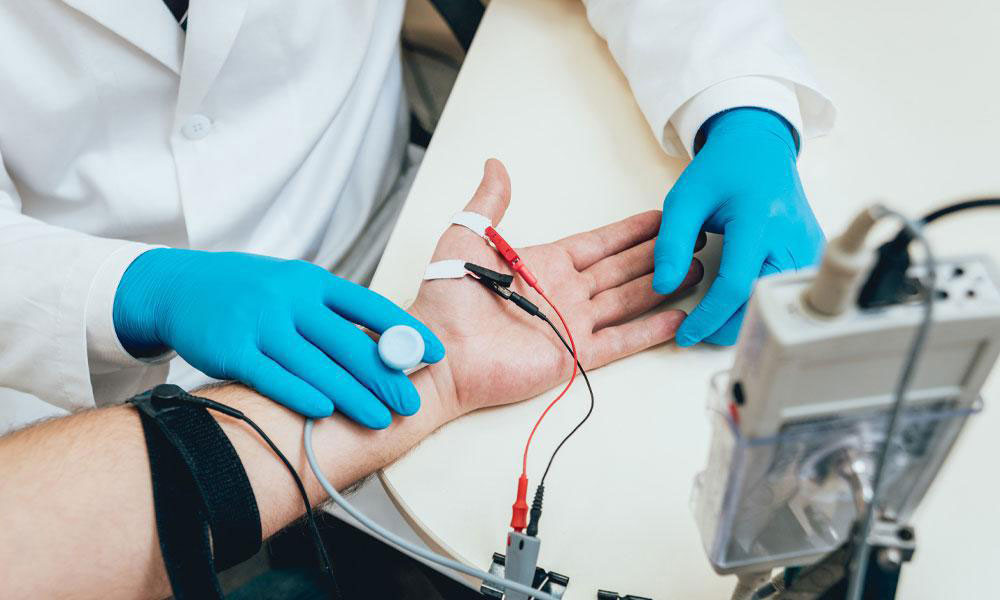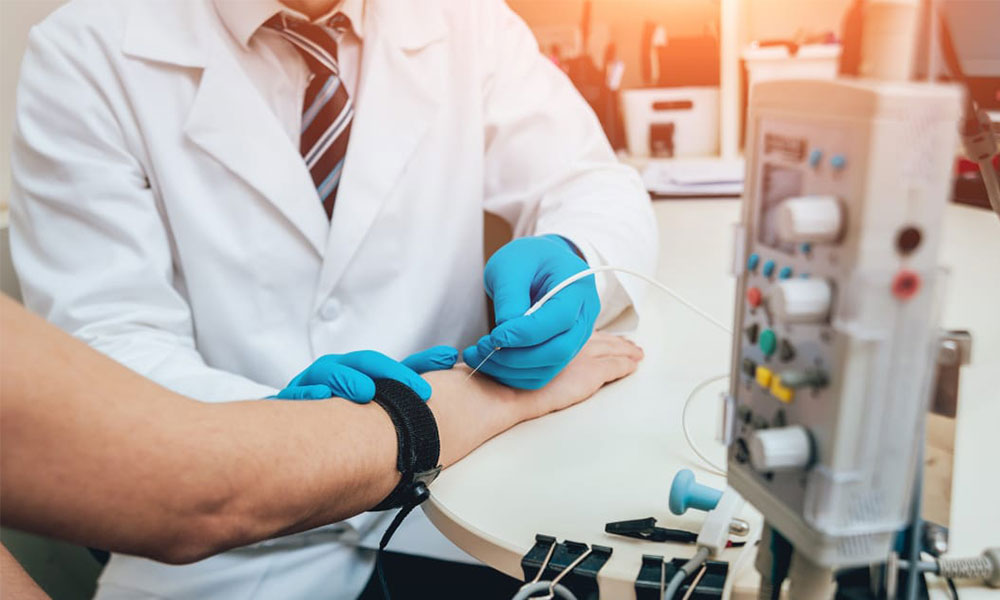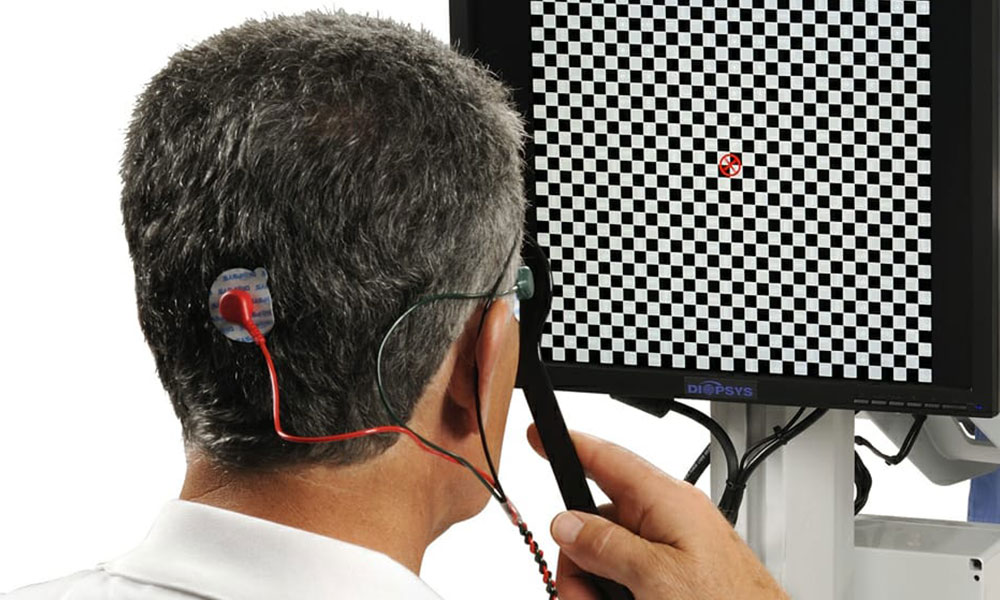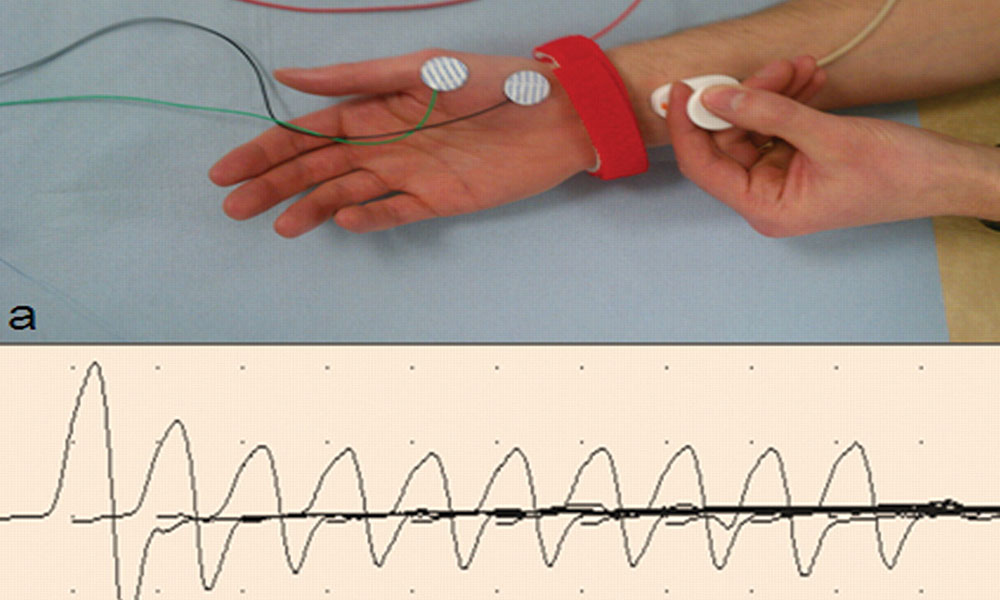Overview
A stroke occurs when the blood supply to part of your brain is interrupted or reduced, preventing brain tissue from getting oxygen and nutrients. Brain cells begin to die in minutes.A stroke is a medical emergency, and prompt treatment is crucial. Early action can reduce brain damage and other complications.
Symptoms

When to see a doctor
Seek immediate medical attention if you notice any signs or symptoms of a stroke, even if they seem to come and go or they disappear completely. “ BE FAST" and contact doctor.
Causes
There are two main causes of stroke: a blocked artery (ischemic stroke) or leaking or bursting of a blood vessel (hemorrhagic stroke).
Risk factor
Lifestyle risk factors
- Being overweight or obese
- Physical inactivity
- Heavy or binge drinking
- Use of illegal drugs such as cocaine and methamphetamine
Medical risk factors
- High blood pressure
- Cigarette smoking or secondhand smoke exposure
- High cholesterol
- Diabetes
- Obstructive sleep apnea
- Cardiovascular disease, including heart failure, heart defects, heart infection or abnormal heart rhythm, such as atrial fibrillation
- Personal or family history of stroke, heart attack or transient ischemic attack
- COVID-19 infection
Prevention
- Controlling high blood pressure.
- Lowering the amount of cholesterol in your diet.
- Quit tobacco use.
- Managing diabetes.
- Maintaining a healthy weight.
- Eating a diet rich in fruits and vegetables.
- Exercising regularly.
- Avoid Drinking alcohol
- Treating obstructive sleep apnea (OSA).
- Avoiding illegal drugs.
Preventive Medications
- Anti-platelet drugs. Platelets are cells in your blood that form clots. Anti-platelet drugs( Ecosprin, Clopidogrel) make these cells less sticky and less likely to clot.
- Anticoagulants. These drugs reduce blood clotting. Heparin is fast acting and may be used short-term in the hospital.
For long term oral agents like warfarin, dabigatran, rivaroxaban, apixaban may be used over a longer term.
Primary headaches
- A primary headache is caused by overactivity of or problems with pain-sensitive structures in your head. A primary headache isn't a symptom of an underlying disease.
- Chemical activity in your brain, the nerves or blood vessels surrounding your skull, or the muscles of your head and neck (or some combination of these factors) can play a role in primary headaches. Some people may also carry genes that make them more likely to develop such headaches.
- The most common primary headaches are:
- Migraine
- Tension type
- Trigeminal autonomic cephalalgia (TAC), such as cluster headache and paroxysmal hemicrania
- Others: cough headaches, exercise headaches etc.
- Some primary headaches can be triggered by lifestyle factors, including:
- Alcohol, particularly red wine
- Certain foods, such as processed meats that contain nitrates
- Changes in sleep or lack of sleep
- Poor posture
- Skipped meals
- Stress
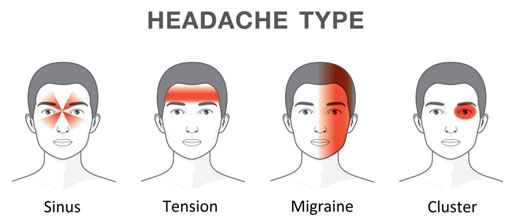
Secondary headaches
- A secondary headache is a symptom of a disease that can activate the pain-sensitive nerves of the head. Any number of conditions — varying greatly in severity — may cause secondary headaches.
- Possible causes of secondary headaches include:
Acute sinusitis (nasal and sinus infection) ,Arterial tears (carotid or vertebral dissections), Blood clot (venous thrombosis) within the brain, Brain aneurysm,Brain tumor,Coronavirus disease 2019 (COVID-19),Dental problems,Ear infection (middle ear),Giant cell arteritis(inflammation of the lining of the arteries),Glaucoma(acute angle closure glaucoma),Hangovers,High blood pressure (hypertension),Intracranial hematoma,Meningitis,Overuse of pain medication,Panic attacks and panic disorder,Persistent post-concussive symptoms (Post-concussion syndrome),Pseudotumor cerebri,Stroke
A person with vertigo will have a sense of spinning dizziness. Vertigo is a symptom of a range of conditions. It can happen when there is a problem with the inner ear, brain, or sensory nerve pathway.
Symptoms
A person with vertigo will feel as though their head or the space around them is moving or spinning.
Vertigo is a symptom, but it can lead to or occur alongside other symptoms, too.
These may include:
balance problems,lightheadedness,a sense of motion sickness,nausea and vomiting,ringing in the ear, called tinnitus,a feeling of fullness in the ear,headaches, nystagmus, in which the eyes move uncontrollably, usually from side to side
CAUSES
- BPPV
- The inner ear contains structures called the otolith organs,
which contain fluid and particles of crystals of calcium carbonate.
- In BPPV, these crystals become dislodged and fall into the semicircular canals.
There, each fallen crystal touches sensory hair cells within the cupula of the semicircular canals during movement.
- As a result, the brain receives inaccurate information about a person’s position, and spinning dizziness occurs. People typically experience periods of vertigo that last less than 60 seconds, but nausea and other symptoms may also occur.
- Labyrinthitis
- This disorder can happen when an infection causes inflammation of the inner ear labyrinth. Within this area is the vestibulocochlear nerve.
- This nerve sends information to the brain about head motion, position, and sound.
- Ménière’s disease
- This disease causes a buildup of fluid in the inner ear, which can lead to attacks of vertigo with ringing in the ears and hearing loss. It tends to be more common in people between the ages of 40 and 60 years.
- The exact cause is unclear, but it may stem from blood vessel constriction, a viral infection, or an autoimmune reaction. There may also be a genetic component that means that it runs in some families.
Overview
- Epilepsy is a common condition that affects the brain and causes frequent seizures.
- Seizures are bursts of electrical activity in the brain that temporarily affect how it works. They can cause a wide range of symptoms.
- Epilepsy can start at any age, but usually starts either in childhood or in people over 60.
Symptoms of epilepsy
- Seizures can affect people in different ways, depending on which part of the brain is involved.
- Possible symptoms include:
- uncontrollable jerking and shaking, called a "fit"
- losing awareness and staring blankly into space
- becoming stiff
- strange sensations, such as a "rising" feeling in the tummy, unusual smells or tastes, and a tingling feeling in your arms or legs
- collapsing
- Sometimes you might pass out and not remember what happened.
Causes of epilepsy
- In epilepsy, the electrical signals in the brain become scrambled and there are sometimes sudden bursts of electrical activity. This is what causes seizures.
- In most cases, it's not clear why this happens. It's possible it could be partly caused by your genes affecting how your brain works, as around 1 in 3 people with epilepsy have a family member with it.
- Occasionally, epilepsy can be caused by damage to the brain, such as damage from: stroke , brain tumour , severe head injury, drug abuse or alcohol misuse , brain infection, lack of oxygen during birth
Treatments for epilepsy
- Treatment can help most people with epilepsy have fewer seizures or stop having seizures completely.
- Treatments include:
- medicines called anti-epileptic drugs – these are the main treatment
- surgery to remove a small part of the brain that's causing the seizures
- a procedure to put a small electrical device inside the body that can help control seizures
- a special diet (ketogenic diet) that can help control seizures
- Some people need treatment for life. But you might be able to stop treatment if your seizures disappear over time.
OVERVIEW
- Dementia is a syndrome – usually of a chronic or progressive nature – in which there is deterioration in cognitive function (i.e. the ability to process thought) beyond what might be expected from normal ageing. It affects memory, thinking, orientation, comprehension, calculation, learning capacity, language, and judgement. Consciousness is not affected. The impairment in cognitive function is commonly accompanied, and occasionally preceded, by deterioration in emotional control, social behaviour, or motivation.
- Dementia results from a variety of diseases and injuries that primarily or secondarily affect the brain, such as Alzheimer's disease or stroke.
Signs and symptoms
Dementia affects each person in a different way, depending upon the impact of the disease and the person’s personality before becoming ill. The signs and symptoms linked to dementia can be understood in three stages.
- Early stage: the early stage of dementia is often overlooked, because the onset is gradual.
Common symptoms include: forgetfulness, losing track of the time,becoming lost in familiar places.
- Middle stage: as dementia progresses to the middle stage, the signs and symptoms become clearer and more restricting.
These include: becoming forgetful of recent events and people's names ,becoming lost at home ,having increasing difficulty with communication ,needing help with personal care ,experiencing behaviour changes, including wandering and repeated questioning.
- Late stage: the late stage of dementia is one of near total dependence and inactivity. Memory disturbances are serious and the physical signs and symptoms become more obvious.
Symptoms include: becoming unaware of the time and place ,having difficulty recognizing relatives and friends ,having an increasing need for assisted self-care ,having difficulty walking .experiencing behaviour changes that may escalate and include aggression.
Common forms of dementia
There are many different forms of dementia. Alzheimer's disease is the most common form and may contribute to 60–70% of cases.
Other major forms include vascular dementia, dementia with Lewy bodies (abnormal aggregates of protein that develop inside nerve cells),
and a group of diseases that contribute to frontotemporal dementia (degeneration of the frontal lobe of the brain).
The boundaries between different forms of dementia are indistinct and mixed forms often co-exist.
Treatment and care
The principal goals for dementia care are:
- early diagnosis in order to promote early and optimal management
- optimizing physical health, cognition, activity and well-being
- identifying and treating accompanying physical illness
- detecting and treating challenging behavioural and psychological symptoms
- providing information and long-term support to carers.
Overview
Parkinson's disease is a progressive nervous system disorder that affects movement. Symptoms start gradually, sometimes starting with a barely noticeable tremor in just one hand. Tremors are common, but the disorder also commonly causes stiffness or slowing of movement.
In the early stages of Parkinson's disease, your face may show little or no expression. Your arms may not swing when you walk. Your speech may become soft or slurred. Parkinson's disease symptoms worsen as your condition progresses over time.
Symptoms
Parkinson's disease signs and symptoms can be different for everyone. Early signs may be mild and go unnoticed. Symptoms often begin on one side of your body and usually remain worse on that side, even after symptoms begin to affect both sides.
Parkinson's signs and symptoms may include:
- Tremor : A tremor, or shaking, usually begins in a limb, often your hand or fingers. You may rub your thumb and forefinger back and forth, known as a pill-rolling tremor. Your hand may tremble when it's at rest.
- Slowed movement (bradykinesia): Over time, Parkinson's disease may slow your movement, making simple tasks difficult and time-consuming. Your steps may become shorter when you walk. It may be difficult to get out of a chair. You may drag your feet as you try to walk.
- Rigidity : Muscle stiffness may occur in any part of your body. The stiff muscles can be painful and limit your range of motion.
- Impaired posture and balance.
Diagnosis
No specific test exists to diagnose Parkinson's disease.Doctor trained in nervous system conditions (neurologist) will diagnose Parkinson's disease based on your medical history, a review of your signs and symptoms, and a neurological and physical examination.Doctor may suggest a specific single-photon emission computerized tomography (SPECT) scan called a dopamine transporter scan (DaTscan).
Medications
Medications may help you manage problems with walking, movement and tremor. These medications increase or substitute for dopamine. They are Levodopa-carbidopa, Dopamin agonist, MAO B inhibtors,COMT inhibtors and anticholinergics. In some cases DBS (deep brain stimulation) can be helpful.
Overview
Meningitis is an inflammation (swelling) of the protective membranes covering the brain and spinal cord. A bacterial or viral infection of the fluid surrounding the brain and spinal cord usually causes the swelling. However, injuries, cancer, certain drugs, and other types of infections also can cause meningitis. It is important to know the specific cause of meningitis because the treatment differs depending on the cause.
Symptoms
Early meningitis symptoms may mimic the flu (influenza). Symptoms may develop over
several hours or over a few days.Possible signs and symptoms are:
Sudden high fever , Stiff neck ,Severe headache that seems different from normal ,
Headache with nausea or vomiting,Confusion or difficulty concentrating ,Seizures,
Sleepiness or difficulty waking,Sensitivity to light ,No appetite or thirst ,Skin rash
Causes
Viral infections are the most common cause of meningitis, followed by bacterial infections
, TB and rarely, fungal and parasitic infections.
Because bacterial infections can be life-threatening, identifying the cause is essential.
Risk factors
- Skipping vaccinations.
- Age. Bacterial meningitis is common in those under age 20.
- Liviing in a community setting. College students living in dormitories, personnel on military bases, and children in boarding schools facilities are at greater risk.
- Pregnancy.
- Compromised immune system. AIDS, alcoholism, diabetes, use of immunosuppressant drugs and other factors that affect your immune system also make you more
- susceptible to meningitis.
Diagnosis and Treatment
- Blood culture
- MRI brain with contrast
- Csf study
According to etiology of meningitis antibiotics,anti virals,anti tubercular treatment or anti fungal drugs are used.
Overview
Peripheral neuropathy, a result of damage to the nerves located outside of the brain and spinal cord (peripheral nerves), often causes weakness, numbness and pain, usually in the hands and feet. It can also affect other areas and body functions including digestion, urination and circulation.
Your peripheral nervous system sends information from your brain and spinal cord (central nervous system) to the rest of your body. The peripheral nerves also send sensory information to the central nervous system.
Peripheral neuropathy can result from traumatic injuries, infections, metabolic problems, inherited causes and exposure to toxins. One of the most common causes is diabetes.
Symptoms
- Signs and symptoms of peripheral neuropathy might include:
- Gradual onset of numbness, prickling or tingling in your feet or hands, which can spread upward into your legs and arms
- Sharp, jabbing, throbbing or burning pain
- Extreme sensitivity to touch
- Pain during activities that shouldn't cause pain, such as pain in your feet when putting weight on them or when they're under a blanket
- Lack of coordination and falling
- Muscle weakness
- Feeling as if you're wearing gloves or socks when you're not
- Paralysis if motor nerves are affected
If autonomic nerves are affected, signs and symptoms might include:
- Heat intolerance, Excessive sweating or not being able to sweat ,Bowel, bladder or digestive problemsDrops in blood pressure, causing dizziness or lightheadedness
Causes
- Vitamin deficiencies. B vitamins — including B-1, B-6 and B-12 — vitamin E and niacin are crucial to nerve health.
- Diabetes. This is the most common cause.
- Alchoholism, various drugs and poisons/chemicals
- Autoimmune diseases. These include Sjogren's syndrome, lupus, rheumatoid arthritis, Guillain-Barre syndrome, chronic inflammatory demyelinating polyneuropathy and vasculitis.
- Infections. These include certain viral or bacterial infections like shingles, Epstein-Barr virus, hepatitis B and C, leprosy, diphtheria, and HIV.
- Charcot-Marie-Tooth disease and other hereditary types of neuropathy.
- Tumors (paraneoplastic syndrome)
- Bone marrow disorders i.e. mayeloma,lymphoma
- Systemic diseases. These include kidney disease, liver disease, connective tissue disorders and an underactive thyroid (hypothyroidism).



